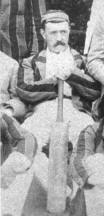Wanderers Football Club was an English association football club. It was founded as "Forest Football Club" in 1859 in Leytonstone. In 1864, it changed its name to "Wanderers", a reference to it never having a home stadium, instead playing at various locations in London and the surrounding area. Comprising mainly former pupils of the leading English public schools, Wanderers was one of the dominant teams in the early years of organised football and won the inaugural Football Association Challenge Cup in 1872. The club won the competition five times in total, including three in succession from 1876 to 1878, a feat which has been repeated only once.

Charles William Alcock was an English sportsman, administrator, author and editor. He was a major instigator in the development of both international football and cricket, as well as being the creator of the FA Cup.
The 1871–72 FA Cup is the modern era name of the 1871–72 Football Association Challenge Cup, the first staging of the Football Association Challenge Cup, the oldest association football competition in the world. Fifteen of the association's fifty member clubs entered this tournament, although three withdrew without contesting. Wanderers successfully pursued on 16 March 1872, at Kennington Oval, London the first FA Cup defeating the Royal Engineers by a single goal, made by Morton Betts, who was playing under the pseudonym A. H. Chequer.

The 1872 FA Cup final was a football match between Wanderers and Royal Engineers on 16 March 1872 at Kennington Oval in London. It was the final of the first staging of the Football Association Challenge Cup, which became the primary cup competition in English football and the oldest football competition in the world. Fifteen teams entered the competition in its first season and, due to the rules in place at the time, Wanderers reached the final having won only one match in the four preceding rounds. In the semi-finals, they drew with the Scottish club Queen's Park, but reached the final when the Scots withdrew from the competition as they could not afford to return to London for a replay.

The 1878 FA Cup final was an association football match between Wanderers F.C. and Royal Engineers A.F.C. on 23 March 1878 at Kennington Oval in London. It was the seventh final of the world's oldest football competition, the Football Association Challenge Cup. Wanderers had won the Cup in the previous two seasons and on four previous occasions in total, including the first FA Cup final in 1872, in which they defeated the Engineers. The Engineers had also won the Cup, having defeated Old Etonians in the 1875 final.

Reginald Courtenay Welch was an English footballer, a key figure in the early years of the sport. He played for the Wanderers in the FA Cup Finals of 1872 and 1873, and also played for England in the first ever international match. During his career he appeared both in goal and as a defender.
Jarvis Kenrick was an English footballer.
The Old Harrovian Association Football Club, more informally known as the Old Harrovians, is a football club from London, England, for former pupils of Harrow School.
The West Kent Football Club was a 19th-century association football and rugby football club that was notable for being one of the twenty-one founding members of the Rugby Football Union, as well as producing a number of international players in the sport's early international fixtures.

Edgar Lubbock LLB was an English amateur footballer who twice won the FA Cup and played first-class cricket. He later became a partner in the Whitbread Brewery, a director and Deputy Governor of the Bank of England and the Master of the Blankney Foxhounds.
William Parry Crake, sometimes known as William Parry, was an English amateur footballer who won the inaugural FA Cup with the Wanderers in 1872 and played for the English XI against Scotland in the representative matches between 1870 and 1872. By profession, he was a merchant in India.
Walter Boldero Paton was an English barrister who also wrote guides to emigration to the British colonies. In his youth, he was a keen footballer who played for Oxford University in the 1873 FA Cup Final and for England in 1871 in a representative match against Scotland.
105th Regiment Football Club was an English association football club in the 19th century, made up of soldiers with the 105th Regiment of Foot.
Pilgrims F.C. was an English association football club based in Clapton, London. During their history they played at various grounds in Tottenham and Walthamstow, but for the most part played home games at Hackney Downs.
Gitanos Football Club was an English association football club and one of the first members of the Football Association.
Woodford Wells Football Club was an English association football club from Woodford Wells in Essex.

Farningham F.C. was a short-lived English association football club from the village of Farningham in Kent.
Southill Park F.C. was an English association football club, originally from Hampstead in London.
Trojans was an English association club based in Leyton.
Herbert Shelley Bevington was an English footballer who played for Clapham Rovers in the 1879 FA Cup final.





